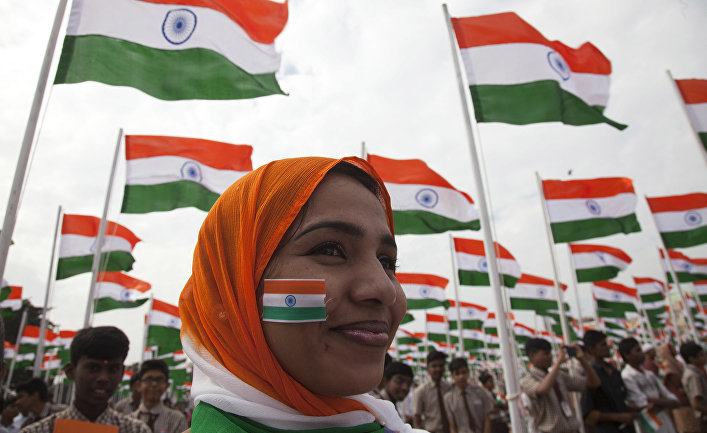
What do young people in countries with developing economies? This, of course, there are a great many different opinions. It is considered that they value education more than young people in the West, and, in addition, they are more religious and conservative. However, surprisingly, reliable data on this subject a bit.
We decided to conduct a survey among young people aged 15 to 21 years in twenty developed and developing countries in different parts of the world. And we asked the same questions — about life, about religious beliefs and their views of international issues.
First of all, we wanted to know whether young people born already in the new Millennium (often referred to as Generation Z), the General views of the world. Or geography, culture and nation mean to them?
First, we asked the question about whether they are satisfied with their lives. We found that young people in emerging economies in General are much more satisfied with their lives than their peers in the West — 90% of Indonesians and 78% of young people in Nigeria said that they are satisfied with their lives, while their opinion is shared by only 57% of young people in Britain and in France.
In addition, they, as a rule, are more optimistic. Here is a country where most young believe that the world situation is changing for the better, such as China, India and Nigeria. But the country where most young people believe that the situation in the world worsens, France and Italy.
Exceptions among the emerging economies are Argentina and Brazil, and there young people are also unduly pessimistic about the future as their peers in Europe.
In the study, the question arises: why is the degree of satisfaction and optimism tend to be higher in most emerging economies than in the West? Perhaps this is because the direction of the country is more important than the current economic situation. In Europe and in the United States standard of living is higher than in most countries of the developing world, however, Europeans and Americans there is a feeling of lost glory, as their lifestyles are threatened by global competition.
Young people in emerging economies are active supporters of liberal values, and it is celebrated even in the case where these values are contrary to the laws of their countries. In India and in China more than half of young people believe that gay marriage should be allowed by law. About three-quarters of young people in India, Brazil and China support equal rights for transgender people is more than in France and Japan.
The vast majority of young people believe that men and women should be equal, and the greatest support for this kind of values noted in very different societies in Canada and in China. Even in India nine out of ten young people support the principle that men and women should be equal, which is slightly larger than in the United Kingdom and in the United States. We can no longer make generalizations about developing countries is conservative, and the developed countries are more liberal.
With all the concerns about religious conservatism and polarization, it is encouraging that two thirds of young people have close friends among members of other religions, and less than one-fifth believe that a person’s religion is an important factor for them when deciding about whether to be friends with someone or not. Even in countries where the rate is highest — for example, in India (29%) and Indonesia (31%) — two thirds of young people do not consider the issue of religion is important when forming friendships.
Still the dissatisfaction that countries with a growing economy too concerned with the improvement of living standards and are not concerned about climate change, is not confirmed by obtained data. The emerging economies are increasingly showing concern about climate change than many Western countries. About three-quarters of young Indian men and two-thirds of Brazilians, Argentines and Nigerians believe this issue is one of the factors that makes them most worry about the future. Since China is the leader in emissions of carbon, it may play a role in the fact that young Chinese are alone, they consider climate change a more serious global threat than extremism.
The emerging economies showed the greatest support for legal migration. Young people in India and China are more inclined to believe that their governments should facilitate the possibility for migrants to live and work in their countries (Turkey is an exception. She feels tremendous pressure because of the flow of Syrian refugees and therefore the most negative attitude towards legal immigration). When we asked young people about whether or not governments have taken measures to address the global refugee crisis, mostly in Brazil and Argentina (among 20 countries) number of answers received about what they are doing too little.
As befits the representatives of the first digital generation, Generation Z, they very much believe that technology can solve our future problems. In China, India and Indonesia, more than 90% of young people called the technology is the factor that gives them the greatest hope for the future, and this figure is higher than in Western countries. They are also more likely than young people in developed countries tend to be concerned about the impact of the lack of the ability in children to get a good education.
The representatives of Generation Z born in countries with developing economies, to a greater extent disposed to travel and make friends in other countries — both online and in real life than members of previous generations. Probably, we should not be surprising that they, in General, agree with their peers in the West for a number of personal and political issues (but there are notable exception — Nigeria belongs to a special category because of their religious conservatism); and they are, perhaps, more support for the international order. Amid the growth of nativism around the world is encouraging the fact that the generation that will inherit the Earth, is, for the most part, of liberal globalists.
The survey was conducted are located in the United Kingdom, a research and consulting firm Populus in the period from 19 September to 26 October 2016. Employees 20088 Populus conducted online interviews of young people aged 15 to 21 years in 20 countries — Argentina, Australia, Brazil, Canada, China, France, Germany, India, Indonesia, Israel, Italy, Japan, New Zealand, Nigeria, Russia, South Africa, South Korea, Turkey, the United Kingdom and the United States.
Vikas Sweat is the Executive Director of the Varkey Foundation.







